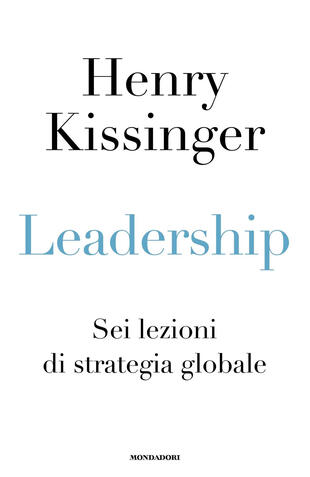

Sinossi
«Ogni società, qualunque sistema politico abbia, si trova eternamente in bilico tra un passato che rappresenta la sua memoria e una visione del futuro che ispira la sua evoluzione. Lungo questa strada, è indispensabile avere una leadership: occorre prendere decisioni, conquistarsi fiducia, mantenere promesse, proporre una rotta da seguire.» Tra coloro che meglio hanno incarnato quest'arte del buon governo, Henry Kissinger, diplomatico e statista leggendario, annovera sei personaggi che hanno forgiato la storia del secondo Novecento. Sei leader straordinari con i quali Kissinger ha avuto modo di interagire o collaborare e che racconta in queste pagine in sei ritratti inediti, individuando le strategie distintive di ognuno. Dopo la seconda guerra mondiale, per esempio, Konrad Adenauer riportò la Germania sconfitta e moralmente distrutta nella comunità delle nazioni con quella che Kissinger chiama «strategia dell'umiltà». Charles de Gaulle abbracciò la causa antinazista e con la «strategia della volontà» restituì alla Francia la sua storica 'grandeur'. A Richard Nixon, del quale Kissinger fu consigliere per la sicurezza nazionale, e alla sua «strategia dell'equilibrio» si dovettero gli sforzi per il disimpegno degli Stati Uniti dalla guerra del Vietnam e il coraggioso tentativo di costruire nuove relazioni con la Cina. Dopo venticinque anni di conflitto, Anwar Sadat portò una visione di pace in Medio Oriente attraverso una «strategia del superamento» dei contrasti. Contro ogni previsione, Lee Kuan Yew creò una potente città-Stato, Singapore, grazie alla «strategia dell'eccellenza». Salita al potere quando l'importanza internazionale della Gran Bretagna era in declino, Margaret Thatcher seppe rinnovare il proprio paese e riposizionarlo al centro della scena con la «strategia della determinazione». Leadership è un testo fondamentale e uno spunto di riflessione per il presente, in cui si avverte la necessità di statisti dotati della lungimiranza e della forza d'animo necessarie a guidare i loro popoli verso destinazioni ricche di speranza.
- ISBN: 8804759437
- Casa Editrice: Mondadori
- Pagine: 600
- Data di uscita: 08-11-2022
Recensioni
There is an endless discussion going on between my father and me regarding the value of history. Is it just 'one damned thing after the other'? What is the point of studying it? And how can we be sure that we really understand historial epochs? In Kissingers latest book he discusses 6 different worl Leggi tutto
I didn't have very high expectations, but I've decided to give it a go after some comments from Ray Dalio. Unfortunately, it turned out to be a disappointment. Why so? 1. it's not a book about leadership; it's a book that justifies (or: "presents in a correct spotlight") a few certain political figur Leggi tutto
The new book by Henry Kissinger looks at six historical figures and the leadership skills that they brought to bear on the rather monumental problems they faced in the post World War II era. I took a look at some of the reviews before I bought the book and will need to dispense with some of the issu Leggi tutto
An incredible book. This is so far the most interesting and illuminating book I read this year. This book combines in a most masterful way: - Interrelations between countries on a high level (macro) - Personalities (micro) The book highlights connections between the two through history and political eve Leggi tutto
I've always found Kissinger a hard author to place. 'Diplomacy' is an enduring classic, his earlier books on nuclear weapons and foreign policy could be compelling, while I found 'World Order' a rambling banality, and 'On China' both engaging and self-indulgent. Leadership: Six Studies in World Stra Leggi tutto
I was immediately attracted to a book that covers Adenauer, de Gaulle, Nixon, Sadat, Lee Kuan Yew and Thatcher in one seating. Yet the title was misleading – is this the ultimate set? Was it really strategy? I would have scratched some, added some others. But I understand that being personally acqua Leggi tutto
Un gran libro con muchas enseñanzas de grandes líderes del siglo XX. Como lección, resaltó la importancia (y la dificultad) de tener una fuerte convicción en las ideas propias sin abandonar la apertura de pensamiento para complementarlas / adaptarlas a diferentes circunstancias. Mis favoritos: 1. Mar Leggi tutto
Ordinary leaders seek to manage the immediate; great ones attempt to raise their society to their visions. I have been lazy recently to write book reviews but these six leaders made me have to do one: - Konrad Adenauer, the first chancellor of the Federal Republic of Germany from 1949 to 1963, unco
One of the best books I have read in years and highly recommend it if you want a better idea of the current world. Dr Kissinger profiles significant leaders who talents, determination , brilliant assessment of the history of their countries and place in the world order and showing how their leadersh Leggi tutto
Provides great context into the politics of the 20th century and also served to disillusion me as to how diplomacy/government is conducted at the top of the power hierarchy. Before reading this, I always thought it was much more institutionalized but it turns out that it's actually very human and pe Leggi tutto
Citazioni
Al momento non ci sono citazioni, inserisci tu la prima!























